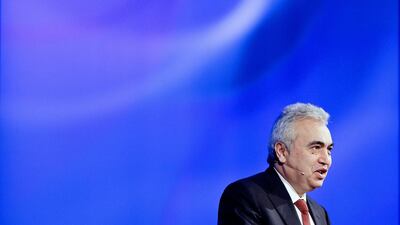Fatih Birol, the incoming head of the International Energy Agency (IEA), says the Middle East's big oil-producing countries should improve the terms they offer to attract oil industry investment to avoid another crisis.
Mr Birol, who is currently the IEA’s chief economist and is expected to take over in September, said the oil price crash over the past year or so has given rise to a misplaced complacency by oil consumers, with talk of the waning importance of regional oil producers for the world economy.
“There is a major misunderstanding in the oil markets in terms of the shape of the oil shale revolution,” Mr Birol said, referring to the technological advances that have made it possible to extract oil economically from non-porous rocks. The “fracking” phenomenon has more than doubled oil production in the US in the past four years and spread to other parts of the world.
“US oil production has increased substantially and that is excellent news for the US and the world oil markets, but the US and Canada will never be producing enough to replace supply from the Middle East,” said Mr Birol.
“The Middle East will remain the world’s most important source of oil for decades to come because of its huge resource base and the low cost of production.”
But there are danger signs in the current situation.
“The situation in the Middle East today, both the geopolitical situation and investment environment, worries me substantially,” he said.
"The Middle East has huge oil reserves and the geology is such that it is easier to extract than in places like Brazil, the US, Canada, but because of the geopolitical concerns many companies are reluctant to make investments," he said. "My second worry is when I look at many countries in the region I do not see the investment framework that can attract investments from international oil companies. This is especially important at a time when companies are cutting investment because of the oil price environment."
The IEA’s estimate is that investment by international companies to develop production will be 20 per cent lower this year. “We have never seen in history – even in the time of the financial crisis – companies cutting by so much in a year,” said Mr Birol.
“These three things – geopolitical uncertainty, the unattractiveness of the investment framework and companies cutting spending this year – worries me very much for production growth over the next few years.”
The typical investment cycle for the oil industry means that investment made now should mean first production coming on-stream in six or seven years at the earliest. But as the world economy starts to improve, oil demand will increase dramatically, according to IEA projections.
Over the next two decades, for example, developing Asia alone will add 1.5 billion new cars – 1.5 times the cars currently on the road globally – and a third of global oil demand growth will come from new lorries in Asia, according to the IEA.
“The world needs Middle East oil and if we don’t see investment coming in a timely manner we may well see another crisis,” with oil shortages and severe price spikes, said Mr Birol.
Higher oil prices may have been considered beneficial for Middle East countries in the past, but history has shown that price spikes encourage alternative oil supplies and the curbing of demand, which in turn leads to periods of extreme price volatility.
"The roles are changing and both the producers and consumers need to redefine their energy strategies according to the new realities of life," said Mr Birol, noting that growth in oil production in the US and Canada in the past four years was three times that of Opec, while oil demand growth in the Middle East has been second only to Asia.
Mr Birol pointed to two noteworthy signs of progress. On the demand side, governments in the region are recognising that energy conservation can be achieved without much cost or political pain, notwithstanding the sometimes fraught debate over fuel subsidies.
Governments here have noticed that, for example, countries like Germany have managed to keep household fuel bills unchanged for a decade even while appliances in the house have grown tenfold.
The other sign of progress is from new governments in Iraq and Iran, which are among those recognising the need to offer more attractive terms to international oil companies.
“Some governments have now moved from a dogmatic position to a more pragmatic one,” Mr Birol said.
“They recognised that the conditions that are on the table needed to be viewed from the current market, when investment is being cut by 20 per cent … They are not moving all the way to [production-sharing agreements] but are aligning the interests more of both the companies and the governments.”
amcauley@thenational.ae
Follow The National's Business section on Twitter

